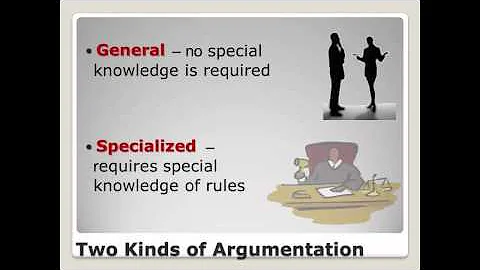What does argumentation mean?
Table des matières
- What does argumentation mean?
- What is argumentation methodology?
- What do you mean by argumentative skills?
- What is research argumentation?
- How will you use argumentation in your life?
- What is the difference between reasoning and argumentation?
- What are examples of argumentation?
- Why do we use argumentation?
- What is a good argument?
- What is argumentative communication?
- What does a 'argumentation' really mean?
- What are important principles of argumentation?
- How to formulate an argument?
- What is another word for argumentation?

What does argumentation mean?
Definition of argumentation 1 : the act or process of forming reasons and of drawing conclusions and applying them to a case in discussion. 2 : debate, discussion. Synonyms Example Sentences Learn More About argumentation.
What is argumentation methodology?
Argumentation theory, or argumentation, is the interdisciplinary study of how conclusions can be reached from premises through logical reasoning. ... It studies rules of inference, logic, and procedural rules in both artificial and real world settings.
What do you mean by argumentative skills?
Argumentation is the thought process used to develop and present arguments. It is closely related to critical thinking and reasoning. Argument skills belong among the essential 21st century cognitive skills. We face complex issues that require careful, balanced reasoning to resolve.
What is research argumentation?
An academic argument is your stance, your claim, or your take on your topic. ... An academic argument is also based in the research, what we often call "evidence-based." This means you must support your argument with findings from sources you read.
How will you use argumentation in your life?
Argument helps us learn to clarify our thoughts and articulate them honestly and accurately and to consider the ideas of others in a respectful and critical manner. The purpose of argument is to change people's points of view or to persuade people to a particular action or behavior.
What is the difference between reasoning and argumentation?
An argument may have one reason or multiple reasons to be strong. REASONING are statements that link evidence back to reasons or claims. Reasoning should clearly explain why the evidence is relevant.
What are examples of argumentation?
When debating a topic, argumentation is defined as stating opinions using facts and/or reasons to back them up. An example of using argumentation is when a teenager tells his parents all the logical reasons he should be allowed to use the car.
Why do we use argumentation?
Argument helps us learn to clarify our thoughts and articulate them honestly and accurately and to consider the ideas of others in a respectful and critical manner. The purpose of argument is to change people's points of view or to persuade people to a particular action or behavior.
What is a good argument?
A good argument is an argument that is either valid or strong, and with plausible premises that are true, do not beg the question, and are relevant to the conclusion. ... "The conclusion of this argument is true, so some or all the premises are true."
What is argumentative communication?
Argumentative communication Modern approach to making decisions considers real argumentations where rational communicators do the best they can to justify their standpoints in a certain context This is considered to be argumentative communication, the art of persuading based on reason, on facts and not emotions ...
What does a 'argumentation' really mean?
- Argumentation is the process of forming reasons, justifying beliefs, and drawing conclusions with the aim of influencing the thoughts and/or actions of others. Argumentation (or argumentation theory) also refers to the study of that process.
What are important principles of argumentation?
- Structure. A good argument must meet the fundamental structural requirements of a well-formed argument. ...
- Relevance. The reasons that a communicator provides as part of his or her argument must be relevant for the truth or merit of the conclusion.
- Acceptability. ...
- Sufficiency. ...
- Rebuttal. ...
How to formulate an argument?
- 1) Introduce your argument. Start with an introduction that explains what you’re going to argue. ... 2) Start with your strongest evidence. Begin with your most compelling piece of evidence in order to begin convincing others of your viewpoint as quickly as possible. 3) Use deductive or inductive reasoning. This is the path you will take to reach your conclusion. ... 4) Determine validity and soundness. A valid argument is one in which, if all premises are true, the conclusion must be true. 5) Restate your argument in a conclusion. Conclude your argument by again summarizing what your main evidence was and how it proved your premise.
What is another word for argumentation?
- Another word for argument. noun. A discussion, often heated, in which a difference of opinion is expressed: altercation, bicker, clash, contention, controversy, debate, difficulty, disagreement, dispute, fight, polemic, quarrel, run-in, spat, squabble, tiff, word (used in plural), wrangle.













